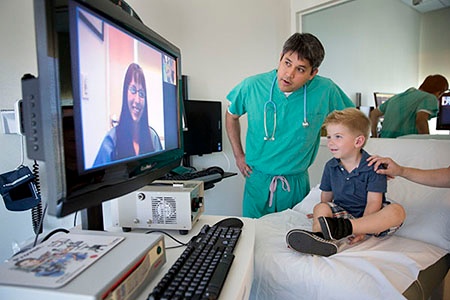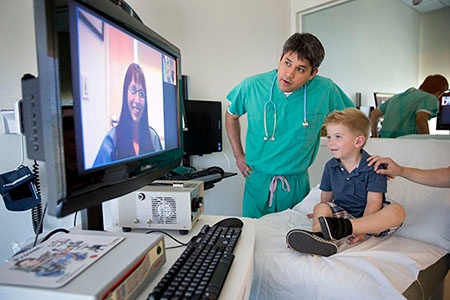
Over the past 60 years, both private and government third-party payment policies have shaped our health care system. Medicare hospital inpatient payment policies during the mid-1980s set a precedent for most payers to change cost-based to prospective payment systems and resulted in hundreds of hospitals closing or merging.
Until 1990, private and public third party payers had no explicit policy to pay for telehealth or telemedicine services. Medicare reimbursed services that did not require face-to-face contact between a patient and practitioner, such as radiology or EKG/ EEG. Reimbursement was idiosyncratic depending on policies of Medicare.
The Balanced Budget Act of 1997 (BBA) signaled a change in Medicare payment policies that opened the door for telemedicine reimbursement. This article will describe current Medicare telemedicine policies and discuss how the growth of telemedicine affects our current and future career Nurses.
Who Can Receive Services
Under the BBA, only services provided to patients in federally-designated rural Health Professional Shortage Areas were eligible. These generally lack primary providers. For example, a community may have a Nurse or GP, but no specialists such as cardiologists, psychologists or even dermatologists. These communities greatly benefit from telemedicine, but the telemedicine providers who served them could not be reimbursed under the BBA.
From this conundrum came the telecommunication consult, fee splitting and general chaos regarding defining the services a patient received, and from whom, and how it was to be compensated. The command to follow the money was not only difficult, but so was finding the money in the first place.
Telecommunication Finally Recognized
The awesome superiority was clear in many instances where personal contact by physicians was not necessary but exchanged technology was vital. There was a flurry in the field of home health care Nursing, which suffered horrendous setbacks in funding during the 90s and the services that survived were cut back in quantity.
Technology changes all businesses and how we conduct them. No better can this be seen than in the growth of the Internet. Developments in bio-informatics, miniaturization, and computer chip design promise major advances in prevention and treatment of disease, including providing health education and counseling in patients’ homes.
Should Nurses Be Concerned?
This new world of health care is not universally available in the USA. The telecommunications for telemedicine are still inadequate or unaffordable in many rural areas. So why should Nurses be concerned? Nurses have much to gain.
1. Telehome care is a Nursing industry.
2. Nurses play a key role in all telemedicine, usually managing.
3. Nurses have been at the forefront of video teleconferencing for preventive services and advocating for policies at national, state, and institutional levels;
4. Nurses often are the key providers of preventive services, many of which would be enhanced by access to telemedicine services.
Given the concerns of third party payers as to whether to pay, the voice of Nurses must be heard. The question for Nurses is: Will we be at the table when decisions setting telehealth payment policies are adopted? The future Nurses’ role must be acknowledged and categorized efficiently as new telemedicine legislation is entered in states like AK and CA. Emphasis must be equal for preventative as well as curative medicine.
Growth of Nursing Responsibilities
Nurses usually have the management and technological administration of both preventative care duties and the tech equipment and shared information with other professionals. This acknowledgement should result in a categorizing of new Nursing skills relative to the technological needs of medicine. As technology in medicine grows, so should the field of RN’s as it embraces additional functions and departments.
Follow the Money to Nursing?
Incredibly, it could be that the future decade will promote the values of the requirements of RN’s to the point that the skills receive increased compensation on a level with their increased duties. Payment of their skills by Medicare and other third party insurers will open a floodgate of better and more efficient medical care for patients and in time will increase the health care of our nation. The USA is considerably behind other countries in this regard despite having the resources and expertise in medical specialization.
The senior population is more likely to need Nursing care, yet the population of qualified Nurses in diminishing. There is increased opportunity for young men and women to enter the Nursing profession as an upwardly mobile career.
Related Articles:
Do People Trust Telemedicine? [INFOGRAPHIC]
With Telemedicine as Bridge, No Hospital Is an Island
Interested in reading more blogs? Sign up for our bi-weekly mailing list below.






